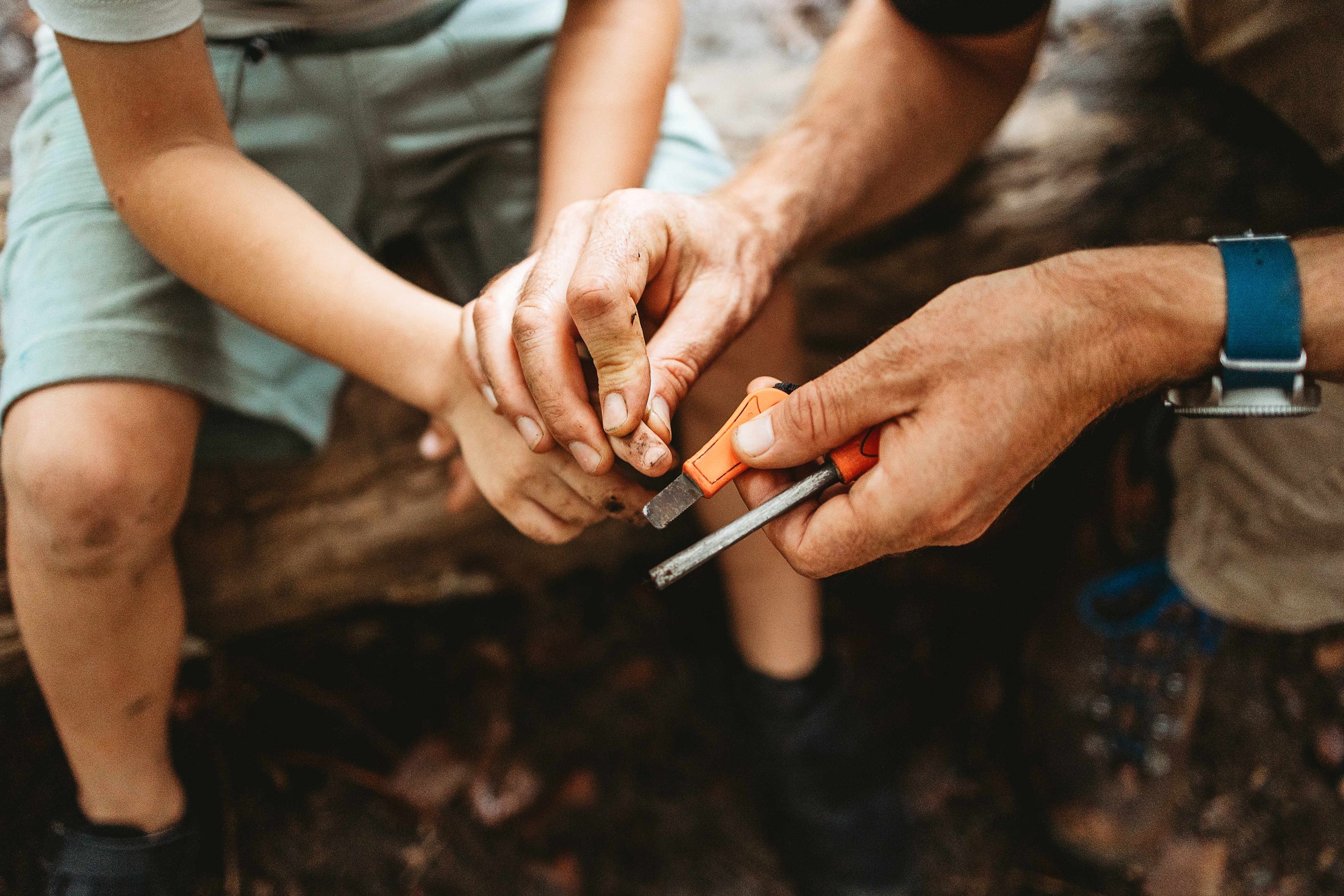The Benefits of Teaching Your Kids Bushcraft and Survival Skills
In today's increasingly urbanised and technology-driven world, the art of bushcraft and survival skills may seem like a relic from a bygone era.
However, these skills are not only relevant but also incredibly beneficial for our children.
At Wildlings, we’re all about empowering kids with hands-on IRL experiences, where they can forge an authentic connection with their environment and become familiar with their inner landscape as they overcome challenges.
Introducing children to bushcraft and survival skills is a wonderful opportunity to put these qualities into practice, as they face what could be the “most risky” scenario – getting lost in the wild or finding themselves in a survival situation.
Of course, we never want this to happen, but if it does, we’d love to think that kids will have a few tricks up their sleeves to give themselves a fighting chance.
Our sessions at Wildlings provide children with the opportunity to do things that, in times gone by, were essential life skills. But many of these skills have now slipped out of focus to be replaced by flashy technology and modern conveniences. These include:
· using flint and steel to start a fire,
· cooking over a campfire,
· using whittling knives,
· building shelters,
· building rafts,
· tying knots,
· and learning to be resourceful in the great outdoors.
In this blog, we'll explore the numerous advantages of teaching your kids bushcraft and survival skills.
From self-reliance to problem-solving abilities, these valuable skills can have a lasting impact on your child's development.
Self-Reliance and Independence:
One of the most significant benefits of teaching bushcraft and survival skills to your kids is fostering self-reliance. These skills empower children to take care of themselves in the great outdoors, instilling a sense of confidence and independence. Whether it's building a shelter, starting a fire, or sourcing clean water, knowing how to meet these basic needs without modern conveniences is a powerful form of self-reliance.
Critical Thinking and Problem-Solving:
Survival situations often require quick thinking and creative problem-solving. By learning bushcraft skills, children develop the ability to assess situations, identify solutions, and adapt to changing circumstances. These problem-solving skills are transferable to various aspects of life, from school projects to personal challenges.
Environmental Awareness:
Bushcraft and survival skills inherently promote a deeper connection with nature. As children learn to navigate and thrive in natural environments, they gain a greater appreciation for the delicate balance of ecosystems. This heightened environmental awareness can lead to a stronger sense of stewardship and a desire to protect our planet.
Resourcefulness and Adaptability:
Surviving in the wild often requires making the most of limited resources. Kids who learn bushcraft skills become resourceful, learning how to use natural materials efficiently. This adaptability can help them develop a "can-do" attitude that extends beyond the wilderness into their everyday lives.
Physical Fitness and Outdoor Enjoyment:
Engaging in bushcraft and survival activities typically involves physical exertion and time spent outdoors. In a world dominated by screens and indoor activities, these skills provide an excellent opportunity for kids to stay physically active and develop a lifelong love for the outdoors.
Crisis Management Skills:
While we hope our children never find themselves in a true survival situation, having the skills to handle emergencies can be life-saving. Learning first aid, navigation, and emergency signalling are integral parts of bushcraft training that prepare kids for unexpected challenges.
Boosted Confidence and Resilience:
Successfully learning and applying bushcraft skills can boost a child's self-confidence. They gain the belief that they can handle adversity and challenges. This newfound resilience can help them face life's ups and downs with greater composure and determination.
Teaching your children bushcraft and survival skills is more than just preparing them for the wilderness - it's equipping them with a valuable set of life skills.
From self-reliance to critical thinking and a deep appreciation for the environment, these skills offer a host of benefits that extend far beyond the realm of survival.
Sometimes, we truly don’t know what kids are capable of until we give them the opportunity to try.
There’s nothing more rewarding than going camping and seeing the kids gather kindling, start the campfire, cook their own food, and manage the fire safely. Witnessing kids take on responsibilities, like being the fire guardian, of their own free will is incredible, and guess what – they want to do it!
Kids want to feel useful.
And gosh, that’s one less responsibility on your plate!
There are so many benefits to teaching kids essential life skills, and while at first they might be reluctant, when they see what these skills allow them to do, they are innately motivated to master them. Even if that means trying and failing to strike a cotton bud on fire with flint and steel, they will keep going until eventually they get it. Then – look out world!
In that process, they realise that the biggest obstacle standing between them and achieving success is their willingness to keep on trying, even when it gets tough.
What an incredible thing to realise at a young age!
If you’re wondering where to start with all this, look no further than our school holiday adventure play programs. Our sessions embed bushcraft and survival skills into play-based learning, where children are supported to explore and experiment at their own pace.
Give your kids the opportunity to unleash their inner Wildling – secure your spot today as our holiday programs sell out fast! Even better, join our mailing list to get VIP access to our school holiday schedule (before the public finds out!)
We hope to see you in the forest soon! Until then, Stay Wild x
Written by Ellen Nesbitt. Ellen is a nature play advocate and creative writer with a passion for helping families connect with the outdoors. She is dedicated to exploring ways to nurture children's creativity, independence, wellbeing and love for nature.
